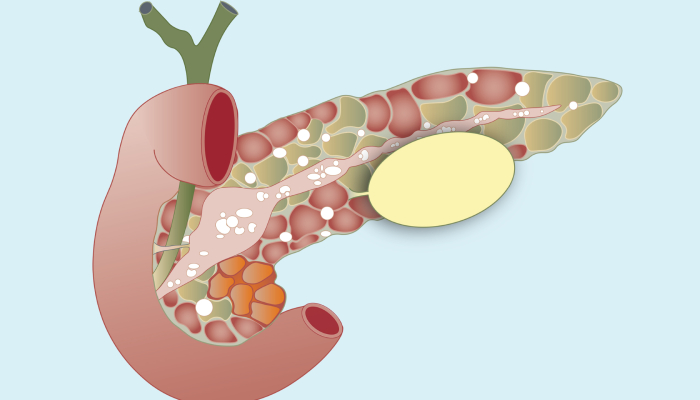What Is Chronic Pancreatitis?
Chronic pancreatitis is a long-term inflammation of the pancreas that does not heal over time. The pancreas, located behind the stomach, plays a vital role in digestion by producing enzymes and regulates blood sugar levels through hormone production.
This condition develops when repeated inflammation damages the pancreas, leading to persistent symptoms over months or years. Unlike acute pancreatitis, which occurs suddenly and resolves quickly, chronic pancreatitis can cause ongoing pain, digestive issues, and complications if left untreated.
For expert chronic pancreatitis treatment in Wakad, Pune, consult Dr. Ujwal Zambare, the Best Gastroenterologist & Pancreas Specialist.

What Causes Chronic Pancreatitis?
There are numerous different causes of chronic pancreatitis. The most common cause is long-term alcohol abuse. Approximately 70 percent of cases are linked to alcohol consumption. Autoimmune disease occurs when your body mistakenly attacks your healthy cells and tissues. Inflammatory bowel syndrome, which is inflammation of the digestive tract, and primary biliary cholangitis, which is a chronic liver disease associated with chronic pancreatitis.
- Autoimmune disease, which occurs when your body mistakenly attacks your healthy cells and tissues
- A narrow pancreatic duct, which is the tube that carries enzymes from the pancreas to the small intestine
- A blockage of the pancreatic duct by either gallstones or pancreatic stones
- Cystic fibrosis, which is a hereditary disease that causes mucus to build up in your lungs
- Genetics
- High blood levels of calcium, which is called hypercalcemia
Who Is at Risk for Getting Chronic Pancreatitis?
Abusing alcohol increases your risk of developing chronic pancreatitis. Smoking is believed to increase the risk of pancreatitis among alcoholics. In some cases, a family history of chronic pancreatitis can increase your risk. Chronic pancreatitis most frequently develops in people between the ages of 30 and 40. The condition is also more common among men than women.
What Are the Symptoms of Chronic Pancreatitis?
- Pain in your upper abdomen
- Diarrhea
- Fatty stools, which are loose, pale, and don’t flush away easily
- Nausea and vomiting
- Shortness of breath
- Unexplained weight loss
- Excessive thirst and fatigue
How Is Chronic Pancreatitis Diagnosed?
During the early stages of chronic pancreatitis, changes in your pancreas are difficult to see in blood tests. For this reason, blood tests typically aren’t used to diagnose the disease. However, they may be used to determine the amount of pancreatic enzymes in your blood. Blood tests may also be used to check blood cell counts along with kidney and liver function. Your doctor might ask you for a stool sample to test for levels of fat. Fatty stools could be a sign that your body isn’t absorbing nutrients correctly.
How Is Chronic Pancreatitis Treated?
Treatment for chronic pancreatitis focuses on reducing your pain and improving your digestive function. The damage to your pancreas can’t be undone, but with the proper care, you should be able to manage many of your symptoms. Treatment for pancreatitis can include medication, endoscopic therapies, or surgery.
Medications
- pain medication
- artificial digestive enzymes if your enzyme levels are too low to digest food normally
- insulin if you have diabetes
- steroids if you have autoimmune pancreatitis, which occurs when your body’s immune system attacks your pancreas
Endoscopy
Some treatments use an endoscope to reduce pain and get rid of blockages. An endoscope is a long, flexible tube that your doctor inserts through your mouth. It allows your doctor to remove pancreatic stones, place small tubes called stents to improve flow, and close leaks.
Surgery
Surgery is not necessary for most people. However, if you have severe pain that isn’t responding to medication, removing part of your pancreas can sometimes provide relief. Surgery may also be used to unblock your pancreatic duct, drain cysts, or to widen it if it’s too narrow.
It’s important to avoid alcohol after you’ve been diagnosed with chronic pancreatitis, even if alcohol wasn’t the cause of your illness. You should also avoid smoking because it can increase your risk of developing pancreatic cancer. You may need to limit the amount of fat in your diet and take vitamins.
Struggling with chronic pancreatitis? Get expert care from Dr. Ujwal Zambare, the Best Gastroenterologist & Pancreas Specialist in Pune. 📞 Request a call back now for consultation and treatment!
